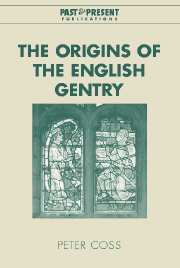Book contents
- Frontmatter
- Contents
- List of illustrations
- Preface
- 1 The formation of the English gentry
- 2 The roots of the English gentry
- 3 The Angevin legacy: knights as jurors and as agents of the state in the reign of Henry III
- 4 The crisis of the knightly class revisited
- 5 Knights in politics: minor landowners and the state in the reign of Henry III
- 6 Knighthood, justice and the early Edwardian polity
- 7 The explosion of commissions and its consequences
- 8 Identity and the gentry
- 9 Knights, esquires and the origins of social gradation in England
- 10 Crystallisation: the emergence of the gentry
- Appendices
- Bibliography
- Index
- Past and Present Publications
6 - Knighthood, justice and the early Edwardian polity
Published online by Cambridge University Press: 10 December 2009
- Frontmatter
- Contents
- List of illustrations
- Preface
- 1 The formation of the English gentry
- 2 The roots of the English gentry
- 3 The Angevin legacy: knights as jurors and as agents of the state in the reign of Henry III
- 4 The crisis of the knightly class revisited
- 5 Knights in politics: minor landowners and the state in the reign of Henry III
- 6 Knighthood, justice and the early Edwardian polity
- 7 The explosion of commissions and its consequences
- 8 Identity and the gentry
- 9 Knights, esquires and the origins of social gradation in England
- 10 Crystallisation: the emergence of the gentry
- Appendices
- Bibliography
- Index
- Past and Present Publications
Summary
Let us take stock. In the preceding chapters I have explained in some detail why I think it is inappropriate to speak of a gentry in Angevin or in post-Angevin England. In particular, I have suggested that the relationship between minor landowners and both the judicial system and the state has been seriously misunderstood by historians and has been approached with a series of misconceptions. At the same time, however, I have argued that the changes which took place in and around the reign of Henry III were momentous. The development of a more exclusive knightly class marked an important stage in the evolution of the lesser nobility and provides an important foundation upon which the later gentry was based. The débâcle towards the end of the reign produced a heightened sense of political community and opened a new era in the relationship between the political centre and the localities.
It was during the decades that followed the period of ‘reform and rebellion’ that the stage was set for the transformation of the lesser nobility into the English gentry. These were the years when the full force of chivalric knighthood began to make itself felt, when knighthood became a more powerful vehicle than ever before for expressing the social and cultural hegemony of England's secular elite. They were also years when a more participatory governmental system – the Edwardian polity – was beginning to take shape.
- Type
- Chapter
- Information
- The Origins of the English Gentry , pp. 136 - 164Publisher: Cambridge University PressPrint publication year: 2003

